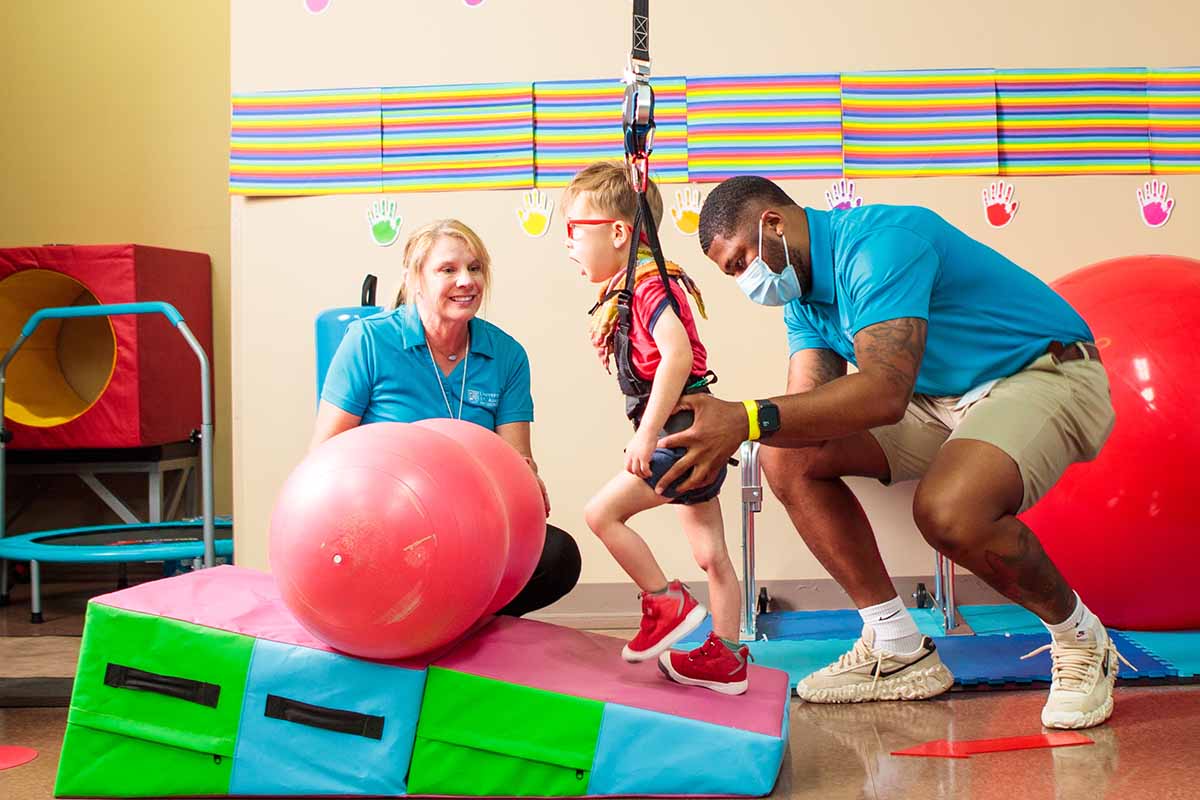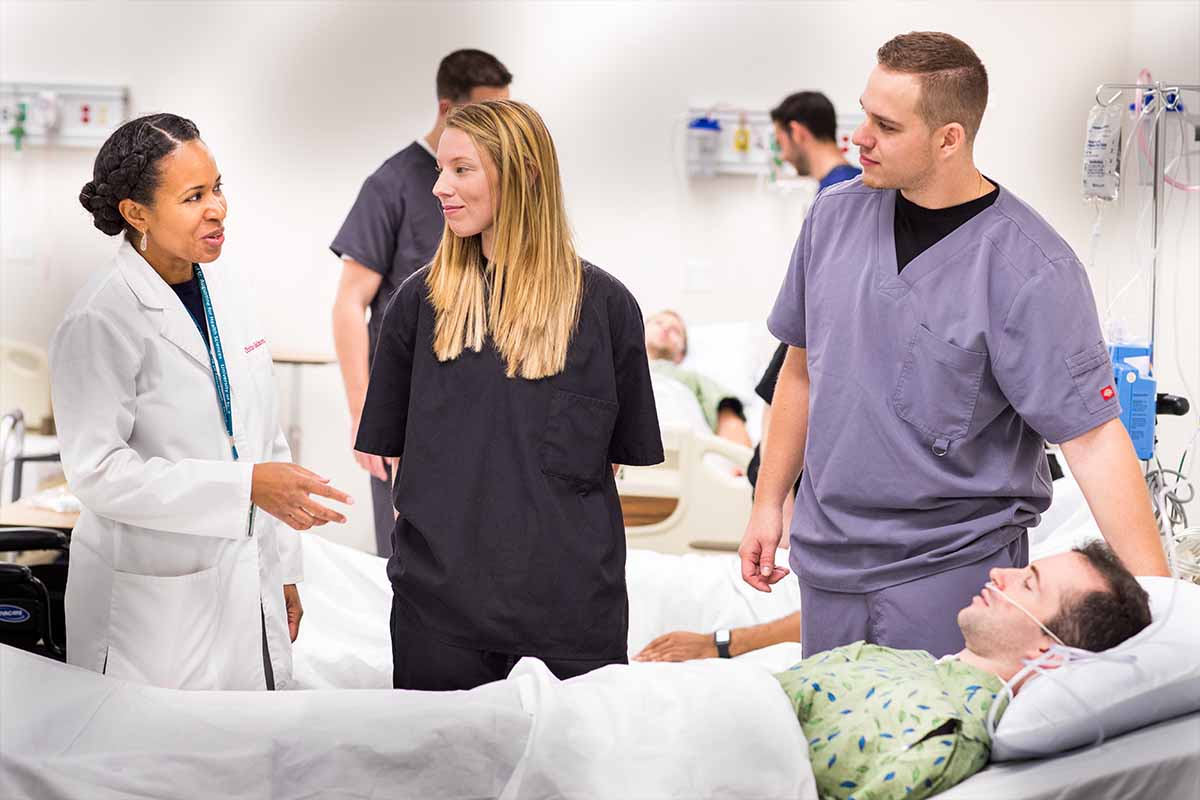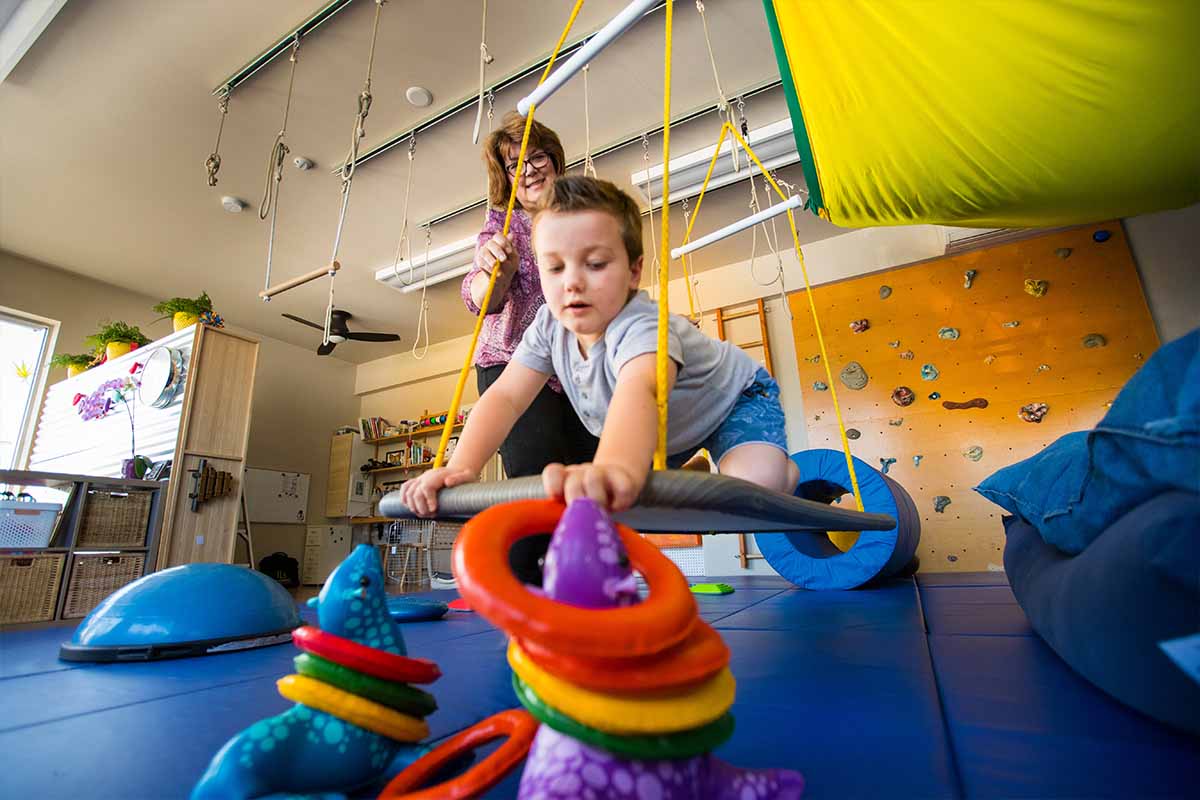
Elizabeth Fain, EdD, OTR/L, FAOTA
Elizabeth (“Beth”) Fain, EdD, OTR/L, FAOTA, is an occupational therapy educator who earned her Doctor of Education degree in 2014 from USAHS. In April, she was presented with the Roster of Fellows Award, one of the most prestigious honors given by the American Occupational Therapy Association (AOTA).
“It’s kind of like a lifetime achievement award,” says Dr. Fain. “The nominating committee looks at your service to AOTA and the community at large, as well as your engagement with OT education and mentorship.” She received the award at the 2021 AOTA Annual Conference & Expo in San Diego, which was held virtually this year.
And indeed, a glance through Dr. Fain’s 17-page resume shows that her storied career has taken her to a range of settings and roles within the occupational therapy profession—and to locations around the world.
As a young clinician with a bachelor’s degree in OT, she chose to work in facilities serving a variety of populations so she could gain wide clinical experience. Within five years, she had moved into clinical leadership roles—developing new programs for staff and patients, directing rehabilitation departments in healthcare organizations, and supervising interprofessional teams that included occupational therapists, physical therapists, and speech-language pathologists.
“I have always loved helping and sharing knowledge with others,” says Dr. Fain. “However, one senior PT who worked for me said, ‘I have only worked for two bosses whom I actually respected, and you are one of them. You should go into academia so that you can help shape future practitioners!’ That quote became an inspiring catalyst for me to move forward into academia.”
Earning Her Doctor of Education Degree at USAHS
She got in touch with a former mentor with connections to USAHS, who encouraged Dr. Fain to pursue our Doctor of Education program.
“My time at USA was a phenomenal experience,” says Dr. Fain.
In the EdD program, she focused on developing curricula for occupational therapy. She appreciated the program’s focus on healthcare and on interprofessional teamwork. “Working side by side with classmates from other disciplines such as physical therapy and speech, you learn about each other’s roles more intimately,” she says. “It gives you ideas for starting your own interprofessional education programs.” She says that today, when hiring faculty members, she looks for people who have extensive experience as clinicians and minimal experience in academia so that she can mentor faculty in the educational best practices she studied in our EdD program.
Honoring Diversity
In early 2019, Dr. Fain founded the Master of Science in Occupational Therapy (MSOT) at Pfeiffer University in Albemarle, North Carolina. She has recruited diverse faculty members who bring different ideas and areas of expertise. The student body is diverse, as well—the most diverse she’s ever seen. She says that in the student admissions process, the enrollment team looks for characteristics that correlate with successful fieldwork and clinicals, such as emotional intelligence, grit factor, locus of control, and observation skills. She notes that there are more African-American students in her MSOT program at Pfeiffer than when she worked as an assistant professor at Winston-Salem State University (WSSU), a historically Black institution. She believes that it’s important to graduate diverse clinicians because “patients who are vulnerable need clinicians they can relate to. We all feel more comfortable with people who are like us.”
Alongside her work directing the MSOT program, Dr. Fain teaches a capstone course and a course in movement and occupation. She has also formed a pro bono clinic in which OT students treat patients from the local community.
“I want to ensure that our OT graduates are lifelong learners—and ethical, visionary leaders in the making.”
She leads fun class projects, such as dancing with students in a TikTok video about an OT sensory pathway down a school hallway that includes hopscotch, jumping jacks, and standing wall push-ups.
Recently, Dr. Fain launched a project to create a 3D-printed milk carton opener after she observed that many senior citizens who get Meals on Wheels have trouble opening the milk cartons they receive. She helped design the device in a collaboration between her MSOT students, a local senior program, and an engineering program at a nearby private school. Her students will help with printing and distributing the devices and educating seniors on how to use them.
The MSOT program is currently a candidate for accreditation by ACOTE. Dr. Fain says that winning the Roster of Fellows Award “will certainly help with recruitment of faculty and students for the MSOT program at Pfeiffer. And being able to say that the program director has achieved such a status will strengthen our case with the accreditation reviewers.” She knows what reviewers look for because she has conducted accreditation reviews for the accrediting arm of AOTA, the Accreditation Council for Occupational Therapy Education (ACOTE). This is just one of several roles she has assumed in service to AOTA, alongside coordinating research and reviewing practice guides and conference proposals.
Embodying the Range of the Profession
In previous faculty roles, Dr. Fain has prioritized engaging students in client-centered learning across diverse ethnic and cultural populations. As an assistant professor at WSSU, she set up a pro bono clinic in which interprofessional students treated patients who were underinsured. She also took students on a Level I fieldwork trip to Ecuador. “You have to really use your critical thinking and problem-solving skills to accomplish the same goal with fewer resources, across the language barrier,” she says. Her students taught Ecuadorian staff and other students professional skills such as transfers, splinting, and therapeutic interventions.
If all these accomplishments weren’t enough, Dr. Fain is a Certified Therapy Dog International Handler and gives presentations on H.O.T. (Higher Order Thinking), an education reform concept. As a researcher, she has examined the effect of early-learning initiative art programs for Latino preschool children. She has published scholarly articles in multiple journals and textbooks, including chapters within Adult Physical Conditions: Intervention Strategies for Occupational Therapist Assistants and Best Practice in School Based Occupational Therapy. Publications and presentations are another factor in the nominations for the Roster of Fellows Award, she says.
“USAHS provided me with multiple opportunities to collaborate with other disciplines, to develop various educational curricula, and to learn from peers and faculty,” she says. “I can wholeheartedly say that I learned from the best—and I will always value my educational experiences with USAHS.”
It’s inspiring to see how Dr. Fain has embodied so many diverse roles within the OT profession: clinician, educator, researcher, advocate, policymaker, administrator. Her resume could be a list of what’s possible in OT. And she attributes some of her success as an educator to her time at USAHS.
The University of St. Augustine for Health Sciences (USAHS) offers an online Doctor of Education (EdD) program focused on healthcare education. Designed for working clinicians and healthcare educators, the program has two required residencies and optional on-campus immersions (scheduled to resume in 2022). Specializations include Nursing Education, Athletic Training, Teaching and Learning (with a teaching internship), and Executive Leadership. Design a customized plan of study that takes advantage of our acceleration options and wide array of electives—and prepare to educate the next generation of healthcare professionals.
USAHS offers hands-on Master of Occupational Therapy (MOT) and Doctor of Occupational Therapy (OTD) degrees. Join a collaborative cohort of peers who learn under the mentorship of expert faculty-practitioners. Practice with mock patients in our state-of-the-art simulation centers and learn anatomy with our high-tech tools. Prepare for clinical practice with patients across the lifespan, as well as advanced roles in research, practice leadership, and policymaking. Residential (online coursework + in-person labs on weekdays) and Flex (online coursework + in-person labs on weekends) formats are available.










